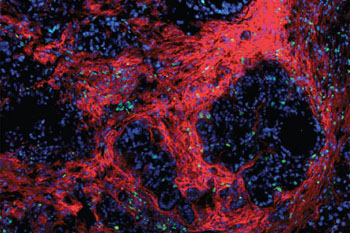Blocking Formation of Scar Tissue Increases Susceptibility of Pancreatic Cancer to Immunotherapy
By LabMedica International staff writers
Posted on 13 Jul 2016
Cancer researchers have shown that treatment with a focal adhesion kinase (FAK) inhibitor rendered pancreatic cancer tumors susceptible to immunotherapy in a mouse model of the disease.Posted on 13 Jul 2016
To date immunotherapy has achieved only limited clinical benefits in patients with pancreatic ductal adenocarcinoma (PDAC). This may be a result of the presence of a uniquely immunosuppressive tumor microenvironment (TME) characterized by a high number of tumor-associated immunosuppressive cells and a scar-like stroma that surrounds the tumor and functions as a barrier to T-cell infiltration.

Image: Pancreatic tumors are surrounded by a protective \"nest\" made of fibrotic scar tissue and the cells that manufacture it (red). A new study in mice demonstrates that disrupting this fibrous tissue makes immune therapy and chemotherapy more effective in attacking tumors of the pancreas (Photo courtesy of the DeNardo Laboratory, Washington University School of Medicine).
Investigators at the Washington University School of Medicine (St. Louis, MO, USA) reported in the July 4, 2016, online edition of the journal Nature Medicine that hyperactivated focal adhesion kinase (FAK) activity was present in neoplastic PDAC cells and acted as an important regulator of the fibrotic and immunosuppressive TME. FAK activity was elevated in human PDAC tissues and correlated with high levels of fibrosis and poor cytotoxic T-cell infiltration.
To block formation of the scar tissue preventing T-cell infiltration, the investigators treated a pancreatic cancer mouse model with the selective FAK inhibitor VS-4718. They found that this treatment substantially limited tumor progression, resulting in a doubling of survival time in the mouse model of human PDAC. This delay in tumor progression was associated with markedly reduced tumor fibrosis and decreased numbers of tumor-infiltrating immunosuppressive cells.
The investigators also found that FAK inhibition rendered the previously unresponsive mouse model responsive to T-cell immunotherapy and PD-1 antagonistic chemotherapeutic agents. A three-drug combination of FAK inhibitor, immune therapy, and chemotherapy more than tripled survival times in some mice.
"Pancreatic tumors are notoriously unresponsive to both conventional chemotherapy and newer forms of immunotherapeutics," said senior author Dr. David G. DeNardo, assistant professor of medicine at the Washington University School of Medicine. "We suspect that the fibrous environment of the tumor that is typical of pancreatic cancer may be responsible for the poor response to immune therapies that have been effective in other types of cancer."
"Proteins called focal adhesion kinases are known to be involved in the formation of fibrous tissue in many diseases, not just cancer," said Dr. DeNardo. "So we hypothesized that blocking this pathway might diminish fibrosis and immunosuppression in pancreatic cancer."
Related Links:
Washington University School of Medicine













